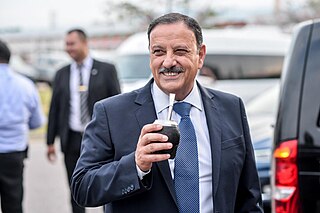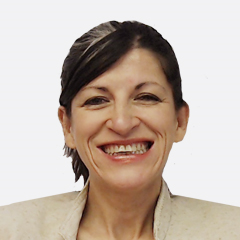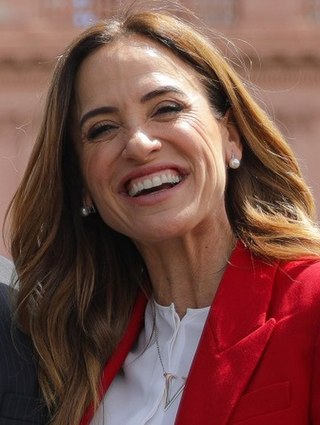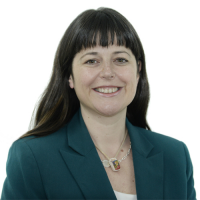
Republican Proposal, usually referred to by its abbreviation PRO, is a political party in Argentina. PRO was formed as an electoral alliance in 2005, but was transformed into a national party in 2010. It is the major component of the Juntos por el Cambio coalition, and its leader is former Argentine president Mauricio Macri, who is the party's president since May 2024.

María Eugenia Vidal is an Argentine politician who served as Governor of the Buenos Aires Province, being the first woman in the office, and the first non-Peronist since 1987. A member of Republican Proposal (PRO), she previously served as Social Development minister of the City of Buenos Aires, and in 2011 she was elected deputy mayor of the city under Mauricio Macri. Since 2021, she has been a National Deputy for the Juntos por el Cambio coalition.

Axel Kicillof is an Argentine economist and politician who has been Governor of Buenos Aires Province since 2019.

Juntos por el Cambio was a political coalition in Argentina. A liberal coalition, it was created in 2015 as Cambiemos, and renamed in 2019. It is composed of Republican Proposal, Radical Civic Union, Civic Coalition ARI and United Republicans.
This table provides a list of nationwide public opinion polls that have been conducted in the run-up to the 2019 Argentine general election, scheduled to take place on 27 October 2019, with a second round to take place on 24 November 2019, should no candidate obtain the necessary number of votes in the first round.

Leonardo Grosso is an Argentine politician. Grosso is a member and one of the most prominent faces of the Evita Movement, a peronist political and social organization. He was a member of the Argentine Chamber of Deputies for Buenos Aires Province for 12 years, from 2011 to 2023.

Verónica María Magario is an Argentine politician, currently serving as Vice Governor of Buenos Aires Province, alongside Governor Axel Kicillof, since 10 December 2019. From 2015 to 2019, Magario was intendente (mayor) of La Matanza, the most populous partido in the Greater Buenos Aires metropolitan area.

Ricardo Clemente Quintela is an Argentine Justicialist Party politician who is currently Governor of La Rioja Province, since 11 December 2019.
Eduardo Néstor de Lázzari was an Argentine lawyer and judge, justice president of the Supreme Court of Justice of Buenos Aires between 2004 and 2005, between 2012 and 2013, and from 24 April 2019 to 18 April 2020.

Eduardo "Bali" Bucca is an Argentine physician and politician of the Justicialist Party. He served as a National Deputy from 2017 to 2021, elected in Buenos Aires Province, and as intendente (mayor) of Bolívar, Buenos Aires from 2011 to 2017. Since 2021, he has been a member of the Buenos Aires Province Senate elected in the Seventh Electoral Section.

María Fernanda Vallejos is an Argentine economist and politician who served as a National Deputy elected in Buenos Aires Province. She was elected in 2017, when she was the first candidate in the Unidad Ciudadana list, and later sat in the Frente de Todos bloc.

Victoria Tolosa Paz is an Argentine politician and public accountant. From 2022 to 2023, she served as Minister of Social Development in the cabinet of President Alberto Fernández. Since 2023, she has been a National Deputy elected in Buenos Aires Province, a position she previously held from 2021 to 2022.

Ana Carolina Gaillard is an Argentine politician, currently serving as National Deputy elected in Entre Ríos Province. Having originally run in 2017, she took office on 19 December 2019, following the resignation Juan José Bahillo. She previously served as deputy from 2013 to 2017. A member of the Justicialist Party, Gaillard sits in the Frente de Todos bloc.

Alejandro Esteban "Topo" Rodríguez is an Argentine politician, currently serving as National Deputy representing Buenos Aires Province. A member of the Justicialist Party, Rodríguez was elected in 2019 for the Federal Consensus coalition. He previously served as Minister of Agrarian Affairs of Buenos Aires Province in the administration of Governor Daniel Scioli.

Avanza Libertad, originally founded in 2019 as Frente Despertar, was an Argentine right-wing political coalition. Renamed in 2020, Avanza Libertad had legal status in the Buenos Aires Province. Ideologically, it is libertarian conservative, supportive of economic liberalism, and critical of both Kirchnerism and Juntos por el Cambio. Led by José Luis Espert, it included centre-right and far-right factions, with its more radical factions being compared to Spain's Vox.

Mónica Edith Litza is an Argentine politician currently serving as a National Deputy elected in Buenos Aires Province. Litza previously held the position from 2016 to 2017. She was a member of the Senate of Buenos Aires from 2003 to 2007 and of the Avellaneda City Council from 2015 to 2019.
This article contains polls on voters' intentions regarding the 2023 Argentine general election, which will elect the country's president and vice president for the 2023–2027 period.

The Argentine provincial elections will elect the executive and legislative authorities of the Autonomous City of Buenos Aires and in 21 of the 23 provinces of Argentina, except (executive) Corrientes and Santiago del Estero; elections in Tucumán and San Juan were suspended by the Supreme Court.

General elections were held in Buenos Aires Province on 22 October 2023, alongside national elections. The governor and vice governor, as well as half of the Chamber of Deputies and a half of the Senate were renewed. In addition, the municipal offices in the 135 partidos were renewed as well.





















